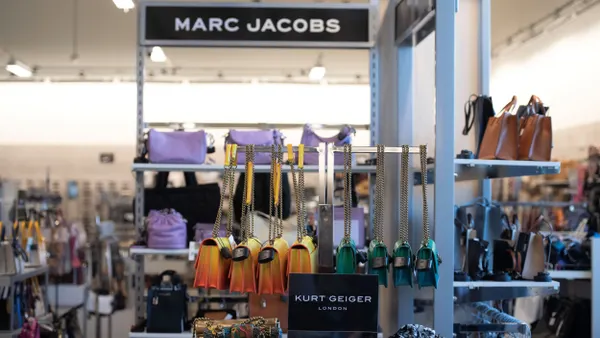Dive Brief:
- Shein, a Chinese fast fashion company, has accused emerging rival Temu of mimicking Shein on social media and web ads to trick users into downloading Temu’s app and visiting its website.
- Roadget Business, which owns Shein’s trademarks in the U.S., filed a lawsuit late last year against Temu’s owner, PDD Holdings Inc. and WhaleCo Inc. In the complaint, Shein also accused its rival of using its copyrighted images on Temu’s website and mobile app.
- “Temu deliberately and strategically launched its website and mobile application in the U.S. while riding off the coattails of the SHEIN brand,” the company said in the lawsuit, which was filed in the U.S. District Court for the Northern District of Illinois. Temu’s owner asked the judge to dismiss the lawsuit this month.
Dive Insight:
The legal battle underscores the growing competition between the two fast fashion companies. Shein highlighted its own surging popularity in its lawsuit, saying it has “skyrocketed in the last several years” among young consumers.
In May 2022, its mobile app became the most downloaded one in the U.S., beating out both TikTok and Instagram, according to the lawsuit. Its social media channels have amassed huge audiences, counting roughly 26 million followers on Instagram, 5.5 million on TikTok and 500,000 on Twitter.
A funding round in 2022 valued Shein at around $100 billion, though the Financial Times reported earlier this year that the company was in fundraising talks that would lower its valuation by around 36%.
Shein’s lawsuit accuses Temu of hatching a scheme to profit off its well-established brand in the U.S. In its original complaint, Shein included images of several Twitter accounts made to imitate Shein’s own account — even though they directed users toward links to download Temu’s mobile app.
Shein also amended its complaint earlier this month to accuse Temu of creating Google ads that appeared to be from Shein but included links to Temu’s website.
They “prominently display ‘SHEIN’ in the headline of the ad in a larger, bolded, and colored font, with the mark ‘Temu’ only being mentioned in tiny gray front within the body of the ad,” according to the complaint.
Shein also takes issue with Temu’s influencer campaigns. According to the lawsuit, Temu provided influencers with “false and misleading” statements about Shein. For instance, it asked them to post that Temu’s clothing was “cheaper and way better quality” than Shein’s apparel.
Both companies have relied on influencers to grow their brands. In Shein’s case, the company has paid thousands of influencers, celebrities, fashion bloggers and reality show contestants to hawk their products, according to the complaint.
Temu asked the court Wednesday to dismiss its case. It called the influencer campaigns in question “mere puffery” and argued that they don’t violate trademark and unfair competition laws.











